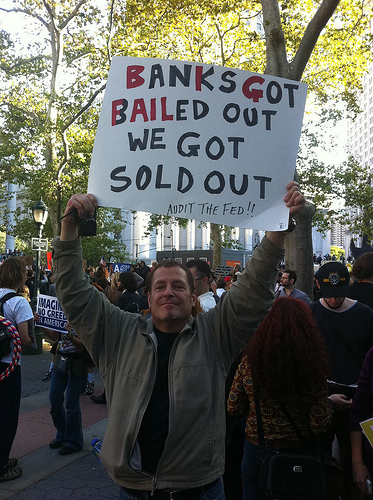by Eric Reygers
de·moc·ra·cy
noun \di-ˈmä-krə-sē\
plural de·moc·ra·cies
Definition of DEMOCRACY
a : government by the people; especially : rule of the majority
The ideology of our country–America, that is–is an integrated system of democracy aimed towards “freedom” but failing by governmental succession from the majority. Unfortunately, the current American governmental idea of democracy is far different than its Utopian ideological counterpart. America’s current formation of governmental rule by way of “democracy” sets forth a precedent in which control is being dispersed through a tangled weave of political puppets and corporate puppeteers. Corporations rob the individuals of our country (the 99%) by effectively pushing legislation through the branches of our government by way of bribery, lobbying, and other scandalous interventions in hopes of profitable outcomes. These outcomes in turn aid the unethical business practices of major corporations inducing profit while Americans struggle for their voices to be heard.
The American people have come or must come to the realization that the citizens of America are not represented through a democracy but rather a “poliarchy” as coined by Robert Dahl. We the citizens must acknowledge that the ideology that our governmental system consists of numerous parties including democrats and republicans is false. One party rules the narrative and underlies the United States democracy, and that is the “business party”. It’s our choice as Americans to have our voices heard and disband from our country’s current form of democracy; we the people can achieve this in a number of ways including activism, peaceful protest, direct action, education, and, most importantly, solidarity.
At the 2002 World Economic Forum, Colin Powell so bluntly stated “Washington has a sovereign right to use force to defend ourselves.” Although our government has that right, the working class individuals of this nation don’t have the right to be heard. Freedom of speech, freedom of the press, or the freedom to peacefully assemble all have been stripped from the American people by its very own government. Although the law is set in place, what does it really mean when our government can repudiate those laws at will? How is that a democracy? Perhaps the answers to these questions are implicit with you the reader; however, it appears discourse and solidarity from us are of utmost importance in order for the masses to answer these questions for themselves.
In the last six months, Americans have become increasingly despondent about our current form of governmental rule and its idiosyncrasies. This despondence can be attributed to the lack of actual democratic governance in our system, being on the verge of another war (Iran), or the countless other fragmentations of our country’s governmental shortcomings. We as citizens of the United States of America have become disenchanted with ignorance and neglect imposed on us by the very government that is meant to represent us as a country.
Celebrating its six month anniversary, the Occupy movement has not only changed the lives and viewpoints of many, but has also increasingly encouraged individuals to share their voice in solidarity and to abolish the deaf ears of our government.
While the celebration of the Occupy movement’s six month anniversary may be short lived, the Occupy movement is now progressing into phase two. Preparations for the new phase are aimed toward larger marches and protests in the hope of reinvigorating the Occupy movement’s aim: To give the citizens of the United States back their voice, fix the governmental monetary system that heavily aids the corporations, and bring back rights to the working class. As Jesse Lagreca implied, “one man equals one vote, one dollar equals one vote, and the people with no dollars will be voiceless.” Is that really democracy? I think not, as do many other Americans. The days of the undignified acceptance of our government’s shortcomings and lack of democratic authenticity are over. It’s time for the American people not to rebuild, but to actually build a democracy, a form of government in which the people are solely in control.
Democracy now or later? I think the veracious question would be, Democracy now or never? The fight has just begun.








4 comments for “Democracy: Now or Later?”